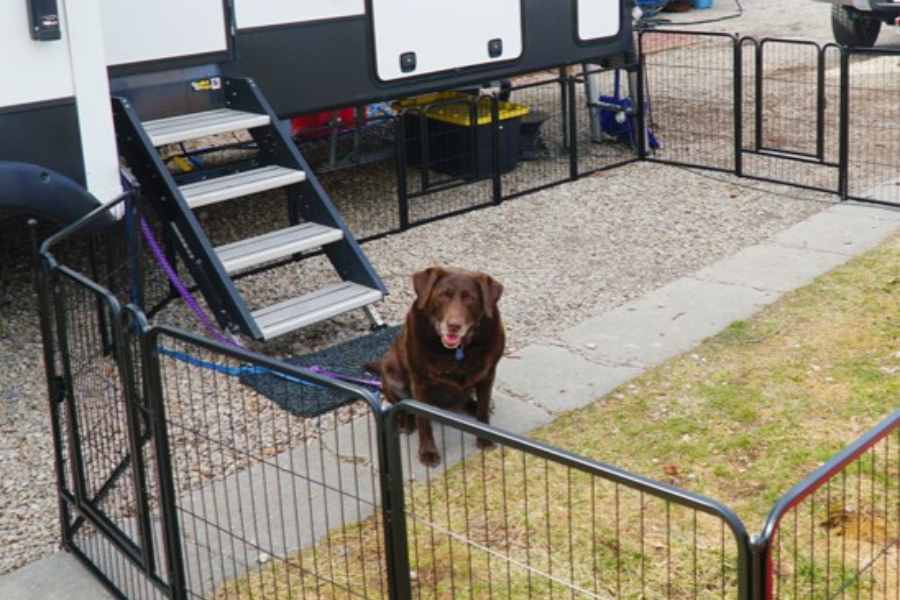Introduction
Labrador Retrievers are beloved for their warm and energetic personalities. This breed often exhibits excellent affability towards humans and other animals, making them ideal family pets. However, to ensure the puppy Labrador grows up to be healthy and happy, dog owners need to pay attention to various aspects of Labrador primary care and considerations.
1. Labrador Personality Traits
Labrador Retrievers, known for their warmth and vitality, are loved for their friendly, active, and loyal nature. This breed often shows outstanding affinity towards humans and other animals, making them ideal family pets.
For first-time dog owners of this lively breed, it is recommended to spend time observing the dog's behavior, adapting to and understanding its unique personality. Using positive reinforcement and appropriate training helps promote positive behavior in Labrador puppy.
2. Labrador Primary Care Considerations
Labrador Retrievers' dietary habits, grooming needs, and potential health issues require special attention. This step is crucial for the overall health of the dog.
Owner's Advice:
Diet: Provide high-quality, balanced dog food according to the recommended feeding amount by the brand. Avoid feeding human food, especially harmful items like chocolate and onions. Provide fruits and water appropriately.
Grooming: Labrador Retrievers' short coat requires weekly grooming to prevent matting and reduce shedding. Pay special attention to the hair around the armpits, ears, and paw pads.
Health Check: Regular veterinary check-ups are essential to ensure the dog's health. Pay attention to teeth, ears, and eyes, and promptly address any issues.

3. Safety and Dog Playpen Selection:
Labrador Retrievers are generally sensitive to external stimuli, requiring an appropriate dog playpen to ensure their safety. This is crucial for preventing escape or exposure to dangerous areas.
Owner's Advice:
To meet the Labrador puppy's activity level, it is recommended to choose a dog fence of appropriate height and design. This not only helps prevent escape but also ensures the dog has sufficient safe outdoor space.
Indoor Activity Area: Define a safe indoor activity area in the home using an Indoor Dog Playpen to limit the dog's movement and prevent access to dangerous areas or furniture.
Garden Protection: If you have a garden or yard, setting up an outdoor dog fence can prevent Labrador Retrievers from digging or damaging plants, maintaining the cleanliness and aesthetics of the gardening space.
Training Ground: During training, a fenced-off area can create a closed training ground, providing a safe environment, reducing external distractions, and helping the dog focus on training activities.
Guest Reception: When guests visit, using a Dog Playpen indoors to limit the dog's access to a specific area can prevent excessive excitement or uncontrolled behavior, making guests feel more comfortable.
Travel Safety: During travel or outdoor activities, carrying a portable outdoor dog fence provides a safe resting and activity space for the Labrador puppy.
"The fence is a lifesaver as we can now let our dogs out safely. We don't have to worry that they will run after something or someone."
4. Daily Labrador Primary Care
Different breeds have varying daily care needs. Labrador Retrievers' grooming requirements and oral hygiene need special attention. Proper labrador primary care helps maintain their health and comfort.
Owner's Advice:
Bathing: Labrador Retrievers typically need a bath every two to three months or as needed. Use professional dog shampoo to maintain skin and coat health.
Oral Hygiene: Regularly check oral health and clean your dog's teeth daily using dog toothbrush and toothpaste to prevent dental issues. Schedule professional veterinary oral examinations and cleanings every 6 months to 1 year to ensure overall dental health.
5. Socialization Needs
Labrador puppies are generally very social and require more interaction and activities. Socialization is crucial for building positive behavior patterns.
Owner's Advice: Emphasize the importance of socialization and encourage active participation in social activities with other dogs and people during the initial stages of dog ownership. This helps in building positive social skills in Labrador puppy.
6. Training Techniques
Labrador Retrievers usually excel in training, but some behaviors may require extra patience and perseverance. Positive reinforcement and rewards are effective training methods.
Owner's Advice:
Excessive Excitement: Labrador puppies are often very active and may exhibit excessive behavior when excited. Patiently train basic commands to control their behavior.
Oral Behavior: Some Labrador puppy may exhibit chewing or biting behavior. Consistent oral training helps educate the dog about appropriate chewing behavior.
Attention Distraction: Due to sensitivity to external stimuli, Labrador Retrievers' attention may sometimes be distracted. Patiently guide the dog's attention during outdoor training, gradually increasing focus.
Owners' key to successful training are patience, consistency, and positive encouragement. Establishing good communication with the dog can overcome some training challenges that may arise, making them joyful companions.

7. Outdoor Activity Recommendations
Labrador puppy are highly active and need sufficient outdoor activities to maintain health. Outdoor activities are crucial for releasing the dog's energy and providing stimulation.
Provide sufficient outdoor activities, including walks, games, and other stimulating activities, based on their activity level. This helps in maintaining the physical and mental health of Labrador puppy.
8. Special Health Issues
Labrador Retrievers may have some specific health issues, such as joint problems and obesity. Regular veterinary check-ups are crucial.
Owner's Advice:
Veterinary Check-ups: Initial veterinary check-ups should begin when the puppy labrador is eight weeks old, followed by at least one comprehensive health check per year. Older types of labradors may require more frequent check-ups. Early detection of potential issues enables preventive and treatment measures.
Joint Health: Regularly observe the dog's activity level and gait, identifying signs of joint issues promptly. Under veterinary guidance, X-rays and other relevant examinations may be conducted.
Weight Management: Labrador Retrievers are prone to obesity. The average lab weight is 55-80 pounds, with specific weight standards varying based on gender and lineage. Veterinary assessment considers the dog's physique, activity level, and overall health to determine whether it falls within the average lab weight. Exceeding 10% above the average weight for a labrador is considered obesity, requiring adjustments to diet and increased exercise to help the dog return to a healthy weight.

9. Family Adaptability
Labrador puppy generally adapt well to a family environment and are friendly with children and other pets. They are warm and reliable companions.
In the initial stages, gradually introduce the dog to family members, paying attention to the dog's interaction with other family members, ensuring harmonious coexistence.
In conclusion
Labrador Retrievers, with their warm and vibrant personalities, make exceptional family companions. Renowned for their friendliness, loyalty, and boundless energy, they thrive in social settings and require ample outdoor activities. types of Labradors' adaptability, intelligence, and trainability contribute to their popularity. By understanding and meeting Laborador primary care requirements, families can enjoy the unparalleled joy and companionship!


Share:
Dog Mom Gifts Idea for 2024-Dog Gift Guide
How to Train A German Shepherd-9 Tips You Need to Know